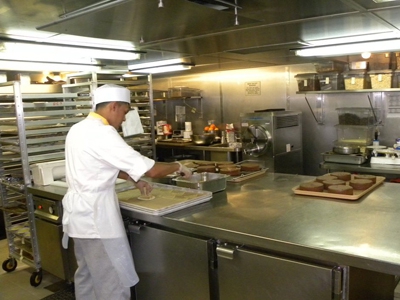ILO Meeting of Experts provide guidance to help Member States with Rgulation 3.2
ILO Meeting of Experts adopted new guidelines on the training of ships’ cooks in order to help Member States with the implementation of Regulation 3.2 and the respective provisions of the Code of the Maritime Labour Convention, 2006
Under these provisions, States parties to the MLC, 2006, must ensure that seafarers on ships flying their flag are provided with food and drinking water of appropriate quality, nutritional value and adequate quantity that takes into account the differing cultural and religious backgrounds, while seafarers employed as ships’ cooks must be appropriately trained and qualified.
The Guidelines cover the multiple aspects of competencies of ships’ cooks, including cooking skills, galley administration, prevention of food-borne disease, food and personal hygiene, nutrition and menu planning, religious and cultural aspects, communication skills, first aid and firefighting in the galley, and waste management.
|
MLC 2006: Regulation 3.2 Purpose: To ensure that seafarers have access to good quality food and drinking waterprovided under regulated hygienic conditions 1. Each Member shall ensure that ships that fly its flag carry on board and servefood and drinking water of appropriate quality, nutritional value and quantity thatadequately covers the requirements of the ship and takes into account the differing culturaland religious backgrounds. 2. Seafarers on board a ship shall be provided with food free of charge during theperiod of engagement. 3. Seafarers employed as ships’ cooks with responsibility for food preparation mustbe trained and qualified for their position on board ship. |
|
Division of responsibilities and obligations There is difference between the responsibilities and obligations of theshipowner, the master and the ships’ cooks in relation to Regulation 3.2 and the provisionand preparation of food for the crew on board ship 1. The shipowner has the following responsibilities and obligations
2. The master has the following responsibilites and obligations
|
The Guidelines will be submitted to the ILO Governing Body for consideration at its 320th Session (March 2014).
The text of the Guidelines may be accessed at
http://www.ilo.org/sector/Resources/codes-of-practice-and-guidelines/WCMS_218575/lang–en/index.htm
|
Suggestions and good practices Stores of food and drink (a) The quantity of food supplies should be appropriate, having regard to the size of the crew andthe duration and nature of the voyage. (b) Food supplies should also be suitable, having regard to the religious and cultural requirementsof a diverse crew. (c) The quality of food should be ensured through the use of trusted suppliers, the appropriatestorage and handling of the raw ingredients in the preparation of food, the use of menu plansand the analysis of regular feedback from the crew. (d) Stores of food should be systematized and regularly reviewed, to make it possible to keeptrack of the quantity and quality of the food. (e) To avoid under-provisioning, stores should be sufficient to provide for a minimum number ofstandard, varied meals. (f) Food wastage should be minimized. (g) If the usual storage rooms are insufficient for keeping supplies for a long voyage, food shouldbe kept in rooms away from diesel fumes and heat (for example, in rooms that are not close tothe engine). (h) A quick response plan should be in place for dealing with any outbreaks of pests. (i) Waste should be managed on board ship in accordance with the provisions of Annex V of theMARPOL Convention. (j) Galley waste should be handled and stored separately from food stores, raw materials anddrinking water and should be kept in bins with closed lids to prevent contamination and pests. |
|
Organization and Equipment (a) Meat slicers, mixing equipment and other similar equipment should be fitted with safetydevices to prevent injuries. (b) Galley equipment such as cookers and ovens should be fitted with pan and door holders forcooking in heavy weather. (c) Fiddles (storm bars) and pan holders should be available for keeping pots and pans on shelvesand worktops. (d) Chilling, refrigeration and freezing equipment should be available in stores and in the galleyand appropriate for the potential crew size and the length of the voyage. (e) Equipment should be available for ventilating the galley, with cooker hoods for removingfumes from the cooker or oven. (f) Food safety management systems should be well defined and, where appropriate, based onhazard analysis and critical control point (HACCP) principles, written documentation andgood management practices (GMPs), or on procedures not requiring documentation, such asthose relating to personal hygiene. (g) Potable water should be provided in the galley for drinking and food preparation. (h) It is important for drinking water equipment to be properly maintained to prevent the growthof bacteria in the system. |
|
Drinking Water (a) The ship should be fitted with a system to provide fresh water (for example, a bunkeringsystem) or have facilities to produce water on board. The water supply should be of goodquality. (b) Water safety plans should be established to ensure the safety of a drinking water supply. (c) Ships’ cooks should be familiar with the ship’s procedures for resolving problems with thefresh water supply as soon as possible. For example, it should be clear who specifically tocontact if a problem is detected. |





































![]](https://safety4sea.com/wp-content/uploads/2024/06/shutterstock_2318996555-350x250.jpg)

























I am very happy guidelines books available in seafarers